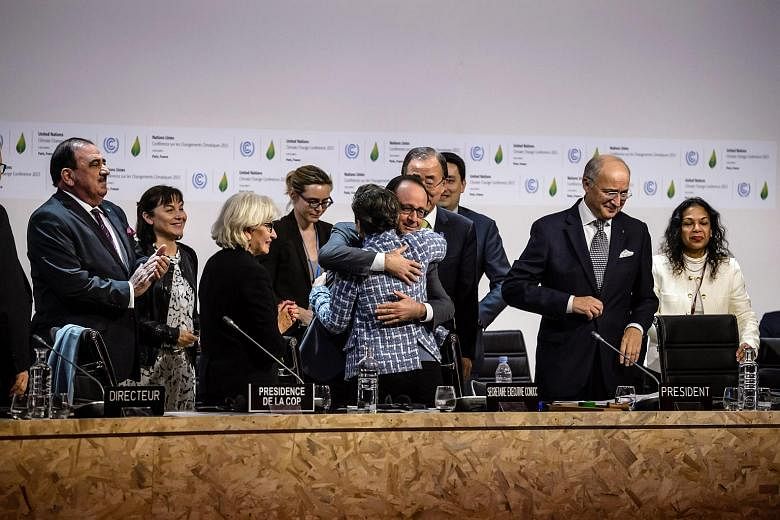The historic Paris agreement adopted at the United Nations climate change summit has been hailed by many as a landmark deal for climate change and a triumph for multilateralism. But some others have labelled it a total hogwash and "epic failure".
What are they really concerned about? It boils down to two words: climate justice. This is a concept that views climate change as an ethical and political issue involving equality, human rights, collective rights and historical responsibility.
The grassroots movement began in 2000, when the first Climate Justice Summit took place in the Netherlands alongside the UN climate change talks. It seeks to draw attention and give voice to those least responsible for climate change, but who bear the brunt of its impact - usually the poor, disempowered and marginalised.
In 2002, a coalition of NGOs which includes Friends of the Earth, Greenpeace and Third World Network, established the Bali Principles of Climate Justice that defined climate change from a human rights and environmental justice perspective.
Since then, a growing army of activists, including former United Nations High Commissioner for Human Rights Mary Robinson, have campaigned for the voices of these people to be heard, and for developed nations to help minimise the climate impact on these communities.
Some within this movement argue that Paris has failed on two counts. First, that even though the treaty aims to limit warming to under 2 deg C, with a view to further cap it under 1.5 deg C, it does not outline concrete or legally binding targets for countries to get there.
Britain-based magazine New Internationalist, in calling the Paris agreement an "epic fail on a planetary scale", pointed out that pledges made by countries, known as Intended Nationally Determined Contributions, fall short of what is needed and is not consistent with the latest science. Critics also take issue with the fact that the deal requires no emission reductions from countries before 2020.
The second complaint, held particularly by civic groups in India, is the lack of mention of "carbon space" or carbon budget. These activists believe emission limits should be set for countries - less for developed nations, more for developing ones - so that the world remains within the safe limit of warming.
While both arguments have their merit, the reality is more complex.
The Kyoto Protocol, adopted in 1997 with participation from 192 parties and which is in place till 2020, has demonstrated that legally binding targets are ineffective because enforcement is weak and countries (such as Canada) could simply drop out to avoid penalties. International UN treaties, where nations agree to a punitive framework, are simply no longer politically achievable.
Under the Paris agreement, targets are not binding, but countries are obliged to declare, communicate and maintain their targets. There is no "penalty" as such, but countries that do not keep their commitments will lose credibility and international standing, which may impact trade and diplomatic relations.
The desire to allocate specific emission limits to countries is not realistic either, because no politician will be able to get such a plan approved by its domestic citizens or Parliaments.
The next best approach is to have voluntary targets that are transparent and open to public scrutiny and pressure. This is exactly what the Paris agreement offers, with options to review these targets every five years and to ramp up cooperation in areas such as finance, forest protection and technology transfer.
More importantly, the Paris agreement is a big deal because it is a powerful show of global willingness to transition into a cleaner, more sustainable era. It sends a clear message - particularly to corporates - that the world has recognised climate change as a serious threat and has set out pathways to tackle it.
The fact is, we are - and climate justice is - better off with the Paris agreement than without it. Rather than slamming it, a more constructive response by the international community would be to encourage the process and mobilise governments and businesses to finance the infrastructure projects needed to achieve a low-carbon, more stable world.
Developing countries should view the agreement as an opportunity to embrace a path of development that leapfrogs existing inefficient and pollutive fossil fuel energy systems. Developed nations must honour their promise of providing the US$100 billion (S$141 billion) floor of financing each year to help developing countries get there.
Let's also not forget that this treaty is the hard-fought result of two decades of tough negotiations and that it went down to the wire. Speaking to reporters late on Dec 12 when the agreement was adopted, Singapore's Foreign Minister Vivian Balakrishnan shared that it was only in the wee hours of that morning that "it all came together", and that he "wouldn't have taken it for granted".
I was in Paris covering the talks and indeed, there were moments when I thought they might fail and we would leave empty-handed.
Tensions ran high on the last day, in anticipation of the final draft. After it was released, an angry activist from India denounced the agreement at a press conference, urging India's officials not to sign on to it. But as more reactions to the draft started to pour in, it became clear that the French presidency, thanks to masterful diplomacy, had managed to navigate countries into common "landing zones" so that everyone could accept the final agreement. Make no bones about it: Gaining consensus from 194 parties is nothing short of a miracle.
Even NGOs known for their tough demands gave their cautious approval. Friends of the Earth climate justice coordinator Lucy Cadena said the agreement "marks a turning point for the balance of power" , while Greenpeace International executive director Kumi Naidoo said of the agreement that "the human race has joined in a common cause".
"[IT] is only one step on a long road… but it is progress. This deal alone won't dig us out of the hole we're in, but it makes the sides less steep," he said.
Extreme activists who describe Paris as a failure ironically chip away at the potential of the deal to bring about the very outcomes they desire. A real Paris failure would be a repetition of what happened in Copenhagen at the same summit six years ago, which would have meant an irrevocable breakdown of trust between nations. Fortunately in Paris, it was the spirit of compromise and cooperation that prevailed.
•The writer is editor of Eco-Business, an Asia-Pacific sustainable business online publication.
•From January, this column will appear on the second Friday of each month.


